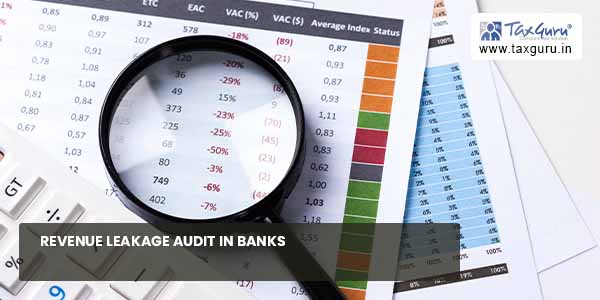In this article author has tried to throw some light on the procedure to be followed while conducting Revenue Leakage Audit in Banks in a brief manner:
Revenue leakage is the one of the critical components of the Bank Audit. In some banks, it is conducted separately while some consider it as a part of Concurrent Audit or Statutory Audit or Internal Audit. Before commencing the audit, we should obtain the following documents from the respective (Bank Branch) business unit preferably on the e-mail.
- Last year Revenue Leakage Report; (if any)
- Loan Balance File (it includes all facilities sanctioned by branch such as Overdraft, Cash Credit, Term Loans etc.);
- Master Circular for applicable loans sanctioned by branch;
- List of SMA & NPA Accounts of branch and Recoveries made during audit period against them.
Following are the important areas which should be covered for successfully completing Revenue Leakage Audit of the Bank Branch: –
1. Interest Earned on Advances.
Interest is the major source of revenue for the branches. Generally, following things are to be considered for checking Interest Income of the banks:
- Sanction Letter for checking the applicable rate of interest on the loan;
- Whether Interest is charged in accordance with relevant circular or scheme of the bank;
- Check Interest on NPA Advances is recognized only on the cash basis;
- Check the interest rate variation report generated from the CBS. This report normally shows the interest rate that are different from the interest rate given for the scheme;
2. Processing/Renewal charges.
i. Processing Fee: –
Processing fee is generally charged by the branch on fresh advances sanctioned during the audit period. In order to find leakage in the processing fees we have to go through the respective loan circular and sanction letter as well. Verify that charges mentioned in Sanction Letter are debited to borrower’s account accordingly. In some banks processing charges are charged on the basis of the rating of the borrower. These charges are recovered at the time of initial sanction. Nowadays, Processing Fee is charged automatically by CBS but still there are high chances where Processing Fee is not charged due to technical glitches in CBS. For some banks & NBFC(s) especially MFI(s), processing fee is major source of revenue as they are charging very high processing fees.
ii. Renewal/Review Charges: –
Cash Credit/OD limits and term loans should be renewed/review every year as per the Banking regulations. So, we have to verify that in every CC/OD/Term loan Account, Renewal Charges are debited or not. These are calculated on the basis of the service charges circular of the respective bank.
iii. Facility Fees
Applicable to NBG(National Banking Group) accounts only on Fund Based (+) Non Fund Based limits (excluding Term Loans) above 1 Crore.

iv. Inspection charges.
Inspection Charges are charged on different types of advances such as term loans, CC, Overdrafts etc.. These are levied because branch is required to inspect different types of securities mortgaged or hypothecated to the bank such as stock and current assets, (generally CC and OD limits) and property in term loans, overdraft limits. Branch officials should carry out inspection of borrower’s site, stock and other current assets depend on the sanction letter, on the basis of limit of advance it is done Monthly/Quarterly/Half Yearly or Yearly. Inspections are also conducted pre or post the sanction of the limit. We have to check that whether charges have been debited according to the terms mentioned in the sanction letter and as per the circular prevailing at the particular time in the bank.
In some banks if facility fee is charged in that case inspection charges are waived off.
v. Documentation charges.
Documentation charges are debited in relation to drafting or modification of standard documents like registered mortgage, equitable mortgage, hypothecation documents for current and non-current assets.
(Waived for NBG accounts above 1 crore. Facility fess recovered in such cases)
vi. Commitment charges
Commitment charges are levied where the borrower has not utilized the sanctioned limit to a specific limit. For example, in some banks if borrower does not utilize at least 50% of the limit sanctioned in that case bank recover the charges from the borrower for non-utilization of the limit which are known as commitment charges. Since the amount is not utilized by the borrower, bank can’t earn interest upon un-utilized portion and bank has its opportunity cost. Generally, it has been seen that branches for achieving their targets sanctions higher limits than needed to the borrower. Here, we should be more specified as CBS are currently not able to deduct them automatically in most of the banks. Commitment charges are levied generally on facilities having limits more than 1 crores.
vii. Locker Rent:
In some branches locker facility is provided and for which a fee is charged. We need to verify Locker Rent received from customers of a particular period with occupancy of lockers during the said period.
viii. Penal Interest
Penal Interest is charged on account of non-submission or delay in submission of stock statements, non-compliance of the terms of sanction, incomplete documentation, non-renewal of facilities after due date (non-submission of renewal data including Audited balance sheet), etc. For example, penal charge is to be levied in case of delay in submission of stock statement, here important thing to check is the physical stock statement because to avoid charges in the account officials of the branch updates the date of latest stock statement without receiving the same in physical.
These were the major cases where revenue leakage is generally identified. But the list of cases where revenue leakage can exist is not exhaustive. The following are also needed to be verified for the purpose of revenue audits:
- Ledger folio charges.
- Cheque book Charges
- Minimum Balance Charges
- Upfront fee
- Credit Information Report charges.
*****
For any inquiry you may write us on: ramanujan.ca@gmail.com
Disclaimer: The information provided by the author in the article is for general informational purposes only. All information provided is in the good faith, however we make no representation or warranty of any kind, express or implied, regarding the accuracy, adequacy, validity, reliability, availability or completeness of any information in the article.





Really an insight study. Long long ago suddenly the bank Debited the OD account with a large amount with description as ” leakage of income”. Be it as it may. Is the Audit do the same exercise by wrong charges debited to customers? These auditors need to look at both side neither the bank left our any income nor charge wrongly on customers.
Another point is knowledge improvement with their staff. When they have a Nodal office to sort out any issue when it is not attended at branch level. But here at Nodal they still have very poor knowledge to sort out the issue. Here too staff service Audit is required.